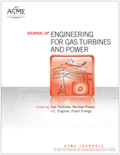
JOURNAL OF ENGINEERING FOR GAS TURBINES AND POWER-TRANSACTIONS OF THE ASME
Scope & Guideline
Powering Innovation in Gas Turbines and Beyond
Introduction
Aims and Scopes
- Gas Turbine Design and Optimization:
Research related to the design and optimization of gas turbine systems, including aerodynamic design, thermal management, and component interactions to enhance efficiency and reduce emissions. - Combustion Dynamics and Emissions Control:
Studies focused on combustion processes, including the investigation of fuel types, combustion stability, and emissions reduction technologies to meet regulatory standards. - Fluid Dynamics and Heat Transfer:
Exploration of fluid dynamics and heat transfer phenomena in various components of gas turbine systems, utilizing computational fluid dynamics (CFD) and experimental validation. - Vibration and Structural Dynamics:
Analysis of vibration characteristics, structural dynamics, and health monitoring of turbine components using advanced modeling techniques and experimental methods. - Advanced Manufacturing Techniques:
Innovations in manufacturing processes such as additive manufacturing and their implications for the performance and durability of gas turbine components. - Hybrid and Renewable Energy Systems:
Integration of gas turbine technology with renewable energy systems, focusing on hybrid and microgrid applications to enhance energy sustainability. - Machine Learning and Data Analytics:
Application of machine learning and data analytics in predictive maintenance, performance monitoring, and optimization of gas turbine operations.
Trending and Emerging
- Hydrogen and Alternative Fuels:
Research focusing on the use of hydrogen and other alternative fuels in gas turbines is increasing, driven by the need for decarbonization and sustainability in energy production. - Advanced Computational Modeling:
There is a significant trend towards sophisticated computational modeling techniques, including machine learning and AI applications, to enhance predictive capabilities in turbine design and operation. - Thermal and Fluid Management Innovations:
Emerging studies are increasingly centered on innovative thermal management systems and fluid dynamics techniques that improve efficiency and performance under varying operational conditions. - Integrated Energy Systems:
Research on integrated systems combining gas turbines with renewable energy sources and energy storage solutions is gaining traction, reflecting a shift towards more holistic energy management approaches. - Real-Time Monitoring and Predictive Maintenance:
The application of real-time monitoring techniques and predictive maintenance strategies is on the rise, utilizing data analytics to enhance operational reliability and efficiency.
Declining or Waning
- Conventional Fossil Fuel Technologies:
Research related to traditional fossil fuel-based gas turbine technologies is diminishing as the industry increasingly shifts towards cleaner, more sustainable energy solutions. - Simple Combustion Models:
The use of basic combustion models is waning in favor of more complex, detailed simulations that incorporate advanced chemistry and turbulence modeling to better predict combustion behavior. - Static Performance Testing:
Static performance assessments are becoming less common as dynamic, real-time testing methodologies gain traction, reflecting a need for more realistic operational data. - Traditional Control Strategies:
Conventional control strategies for gas turbine operation are being overshadowed by more innovative, adaptive, and AI-driven control methodologies that optimize performance in real-time.
Similar Journals

International Journal of Heavy Vehicle Systems
Charting New Paths in Mechanical EngineeringThe International Journal of Heavy Vehicle Systems, published by INDERSCIENCE ENTERPRISES LTD in the United Kingdom, is a pivotal resource for professionals and researchers in the fields of automotive and mechanical engineering. With an ISSN of 1744-232X and an E-ISSN of 1741-5152, this journal serves as an academic platform dedicated to exploring the latest innovations and technologies pertaining to heavy vehicle systems, including design, performance, and environmental impact. Boasting a Category Quartile of Q3 in both Automotive and Mechanical Engineering as of 2023, it ranks among the growing body of literature in these disciplines, indicative of its commitment to quality research. The journal is widely accessible through diverse open access options, encouraging the dissemination of knowledge within the academic community. By publishing cutting-edge studies and reviews, the International Journal of Heavy Vehicle Systems plays an essential role in advancing our understanding of heavy vehicle technologies, providing invaluable insight for engineers, researchers, and students eager to contribute to this dynamic field.
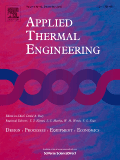
APPLIED THERMAL ENGINEERING
Unveiling the science behind efficient thermal solutions.Applied Thermal Engineering is a leading international journal dedicated to the field of thermal engineering, published by Pergamon-Elsevier Science Ltd. With an impressive impact factor indicating its significance in the academic community, this journal focuses on innovative research and developments related to energy engineering, fluid flow, and transfer processes, as well as manufacturing and mechanical engineering. Being indexed in top quartiles (Q1) across multiple categories, it ranks exceptionally well on platforms like Scopus, ensuring that contributors reach a wide and relevant audience. The journal supports both open access and subscription options, promoting the dissemination of vital research findings from 1996 to 2024. With its commitment to advancing the discipline and implementing rigorous peer-review processes, Applied Thermal Engineering serves as an essential resource for researchers, industry professionals, and students aiming to stay abreast of the latest advancements and applied methodologies in thermal science.

Journal of Power Technologies
Advancing Sustainable Power TechnologiesJournal of Power Technologies is a prestigious academic journal dedicated to advancing the field of power engineering, specifically focusing on innovative technologies and methodologies related to energy production, transmission, and efficiency. Published by the renowned Warsaw University of Technology, Institute of Heat Engineering, this journal is committed to disseminating high-quality research that addresses the challenges and opportunities in the energy sector. Although currently not open access, the journal provides extensive subscription options for access to its comprehensive range of articles. With an emphasis on original research, case studies, and reviews, the Journal of Power Technologies serves as a vital resource for researchers, practitioners, and students alike, aiming to shape the future of sustainable power systems and contribute significantly to the global energy discourse. The journal continues to foster an academic environment where innovation in power technology is highlighted and celebrated, supporting the ongoing quest for sustainable energy solutions.

Thermophysics and Aeromechanics
Transforming Ideas into Technological BreakthroughsThermophysics and Aeromechanics, published by PLEIADES PUBLISHING INC, is an esteemed journal dedicated to advancing the fields of aerospace engineering, energy engineering, modeling and simulation, as well as nuclear and high energy physics. With an ISSN of 0869-8643 and E-ISSN 1531-8699, this journal serves as a vital platform for researchers and professionals working at the intersection of thermophysics and aeromechanics, delivering cutting-edge research, reviews, and case studies. Despite its current position in Quartile Q4 across multiple categories, including aerospace and energy engineering, it provides a unique opportunity for emerging ideas in these domains to gain visibility and impact. The journal's convergence of diverse scientific disciplines is critical for fostering innovation and technological advancements, making it an essential resource for students, practitioners, and academics alike. In this era of rapid scientific development, Thermophysics and Aeromechanics plays a pivotal role in disseminating knowledge and facilitating interdisciplinary collaboration among a global audience.
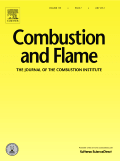
Combustion and Flame
Advancing Knowledge in Combustion PhenomenaCombustion and Flame is a premier academic journal published by Elsevier Science Inc, dedicated to advancing the field of combustion science. Since its inception in 1957, this journal has consistently provided a platform for rigorous research and groundbreaking discoveries in the realms of Chemical Engineering, Chemistry, and Energy Engineering, illustrating a significant Q1 ranking across multiple categories, including Fuel Technology and Physics. With an impressive Scopus ranking, comprising the top 10% in fields such as General Physics and Astronomy, and General Chemical Engineering, Combustion and Flame serves as a critical resource for researchers, professionals, and students aiming to explore the complexities of combustion phenomena and their applications. Although it does not offer open access, the journal is known for its comprehensive articles and innovative research papers, fostering scholarly dialogue and the development of emerging technologies. The journal aims to connect researchers globally, ensuring that important findings are shared and disseminated effectively.
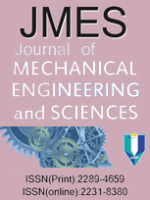
Journal of Mechanical Engineering and Sciences
Connecting Global Minds in Mechanical Engineering ResearchThe Journal of Mechanical Engineering and Sciences (ISSN: 2289-4659, E-ISSN: 2231-8380), published by UNIV MALAYSIA PAHANG, is a prominent open access journal established in 2011, dedicated to advancing the field of mechanical engineering and associated sciences. Covering a wide array of topics from industrial manufacturing processes to computational mechanics, the journal serves as a vital platform for researchers, professionals, and students to disseminate innovative findings and methodologies. With impressive Scopus rankings, including a place in the 60th percentile for Industrial and Manufacturing Engineering, the journal holds a significant position among its peers, facilitating global academic discourse. Located in Kuantan, Pahang, Malaysia, the journal emphasizes accessibility and collaboration within the engineering community, encouraging submissions that contribute to both theoretical and applied aspects of mechanical engineering.

Journal of the Brazilian Society of Mechanical Sciences and Engineering
Elevating mechanical sciences with groundbreaking findings.The Journal of the Brazilian Society of Mechanical Sciences and Engineering, published by Springer Heidelberg, is a pivotal platform dedicated to disseminating cutting-edge research in the realm of mechanical sciences and engineering. With an ISSN of 1678-5878 and an E-ISSN of 1806-3691, this journal showcases innovative findings across various categories, including Aerospace Engineering, Automotive Engineering, and Industrial and Manufacturing Engineering. Notably positioned in the Q2 and Q3 quartiles of its fields as of 2023, the journal highlights the importance of rigorous scientific inquiry, contributing significantly to the understanding and application of engineering principles globally. With a Scopus rank reflecting strong performance in multiple engineering disciplines, this journal serves as an invaluable resource for researchers, professionals, and students seeking to advance their knowledge and explore the frontiers of mechanical sciences. The journal covers a broad range of topics and aims to facilitate collaboration and synergy among experts in the field, enhancing the overall impact of mechanical engineering research.

International Journal of Heat and Technology
Connecting Academia and Industry through Heat ResearchThe International Journal of Heat and Technology is a premier academic publication dedicated to the dissemination of innovative research in the fields of thermal engineering, fluid mechanics, and condensed matter physics. Published by the INT INFORMATION & ENGINEERING TECHNOLOGY ASSOCIATION and based in Italy, this journal has been a significant resource for researchers and professionals since its inception in 1983, with a commitment to advancing knowledge until 2024. With an impact factor that reflects its relevance, the journal encompasses diverse topics within its scope, bridging gaps between theoretical research and practical applications. Although currently not open access, the journal provides valuable insights into the nuances of heat transfer, flow dynamics, and material properties, making it a critical reference for academia and industry alike. The journal's Scopus rankings position it within the competitive landscape of chemical and mechanical engineering, highlighting its contribution to advancing these fields. We invite scholars, professionals, and students to engage with the rich content provided within its pages, to foster a deeper understanding of heat and technology in our rapidly evolving world.

STROJNISKI VESTNIK-JOURNAL OF MECHANICAL ENGINEERING
Exploring Innovations in Mechanics and MaterialsSTROJNISKI VESTNIK-JOURNAL OF MECHANICAL ENGINEERING is a prestigious publication that has been disseminating cutting-edge research in the field of mechanical engineering since 1974. Published by the Association of Mechanical Engineers Technicians Slovenia, this journal serves as a critical platform for professionals, researchers, and students aiming to explore advancements in mechanical engineering and mechanics of materials. With a category ranking in the Q3 quartile for both Mechanical Engineering and Mechanics of Materials, the journal reflects a robust engagement with contemporary research and practices, contributing to the ongoing discourse within these vital disciplines. Although currently not open access, the journal is committed to providing high-quality, peer-reviewed articles that facilitate knowledge sharing and innovation. It is indexed in Scopus, maintaining respectable standings within its categories, thereby underlining its importance and impact in the global academic community.
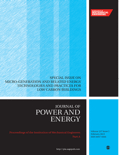
PROCEEDINGS OF THE INSTITUTION OF MECHANICAL ENGINEERS PART A-JOURNAL OF POWER AND ENERGY
Empowering Research for a Sustainable FuturePROCEEDINGS OF THE INSTITUTION OF MECHANICAL ENGINEERS PART A-JOURNAL OF POWER AND ENERGY, published by SAGE PUBLICATIONS LTD, is a pivotal journal dedicated to advancing the fields of mechanical engineering and energy technology. With a history spanning from 1983 to 2024, this journal provides a respected platform for researchers and practitioners to disseminate findings that address contemporary challenges in power generation, energy efficiency, and sustainable engineering practices. As evidenced by its quarter ranking in Q3 within the categories of Energy Engineering and Power Technology, and Mechanical Engineering, it serves as a significant resource for academics aiming to enhance their understanding and explore innovation in these critical areas. While currently not an open-access journal, the research published here is invaluable for both ongoing education and professional practice, making it an essential read for anyone engaged in the engineering disciplines.